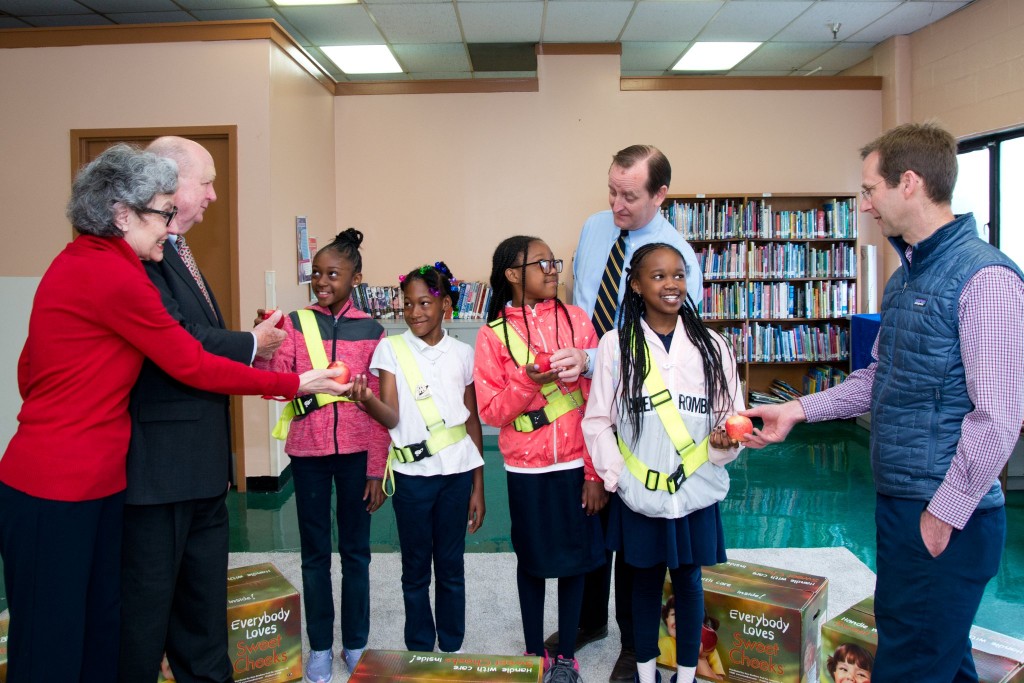On a cold October morning in 2002, Pamela and Christian Wilson were on their way to work when they saw a teenage boy walking across the street, wearing clothes that did not fit him or look warm enough for the weather. “It was chilly, but he still had a smile as he rushed over to the school,” Pamela Wilson recalls.
After inquiring about the boy to the school’s crossing guard, they were told that his family was homeless, and he did not have a winter coat. The Wilsons were eager to help, so they began donating coats to the boy’s school. Shortly after that, other schools in the Baltimore area started approaching the couple about the winter donation drive they started. Their winter coat donation drive has since delivered over 9,000 winter articles of clothing to children, teens, and some adults.
This is just one kind of service the Wilsons have provided to the Baltimore community. They initially started Heart’s Place Services, a nonprofit organization, as a homeless shelter several decades ago. Over the years, the way they provide services has changed, but their responsive approach that depends on close community ties and active listening has remained.
Their partnership with Robert W. Coleman Elementary School is just one example. Over the years, the Wilsons have shown their support for the school in many ways, including applying for an Apples4Ed grant to help provide extra food, art supplies, and clothing for students. Robert W. Coleman was announced as a 2019 Apples4Ed winner, and the Wilsons are thrilled to support its dedicated faculty and staff with extra resources to do more for students.
Throughout the Wilsons’ years of service, they came to realize that one extremely underserved sub-demographic of homeless people in Baltimore are children. Currently, there are about 2,700 registered homeless students in Baltimore Public Schools. “Most of the time, there are siblings at home who are younger or older and are not included in that figure,” says Christian Wilson.
When the Wilsons approached local schools about what else the students need to be successful, they assumed they would be asked to help provide classroom materials such as paper and pencils. Instead, they learned that one of the most important elements students need to be attentive and participate in the classroom is food—and many students were not getting enough of the right nutrition. Teachers and principals see firsthand when homeless students’ lack of access to food throughout the weekend makes the children ill-prepared on Monday mornings because they are stressed, irritable, tired, and hungry from the weekend.
To help alleviate this problem, Heart’s Place Services partners with Robert W. Coleman (and many other schools in Baltimore) to administer a Weekend “Survival” Backpack program that currently helps to feed 620 individuals each weekend, including homeless students and their families. The backpacks now include food for nine meals, which is intended to feed three people once a day for three days.
During a summer pilot program, they gave backpacks of foods to the students, and the Wilsons took note that the children would share the food with their parents. “To eat by themselves is disturbing to them. They want to share with their parents, who are stressed,” says Christian Wilson.
So, the Wilsons found a way to provide more.
Based on research from the Baltimore’s registered homeless population and insights from school administrators, the average household size is usually three people—one single parent and two children. If there are more than three in the family, the program ensures that the student goes home with an extra backpack on the weekends. The backpacks weigh approximately around 12.2 pounds when full, and they include utensils and disposable dishware. However, that’s not the only reason the Wilsons consider their backpack program different from others.
“Our menu is very close to the USDA guidelines for nutrition and caloric content suitable for the growth of a child and for adults. We started with a small population, and now we’re feeding 620 individuals each weekend,” explains Wilson.
Food in the backpacks does not require refrigeration or heat, as many recipients have little to no access to heating or electricity.
The backpacks also include dental hygiene products. The Wilsons learned of a heartbreaking situation in which homeless student had passed away from an infection that spread from his tooth, so they include three toothbrushes and one large tube of toothpaste into the children’s backpacks once a month.
The Wilsons also arranged an agreement with Colgate to provide a mobile service to 11 schools, so that the children can get their teeth checked. “It’s a tremendous service that provides dental care for the first time for many of these children,” says Christian Wilson.
According to the Wilsons, these backpacks are a source of happiness and relief for the students. “In one instance, a school social worker told us she saw kids jumping up and down. Many principals actually cry when they hear about our service,” says Pamela Wilson.
The Wilsons now have ten years of experience working with the schools on their backpack programs. They are especially grateful for all the grants they have been able to bring to their community, like Apples4Ed, which helps to keep children fed and ready to learn.
Having spent so much time with administrators across the school district, the Wilsons were the perfect people to find the school that could benefit most from the Apples4Ed grant, and they selected Robert W. Coleman. The elementary school offers many services to their homeless students, including a washing machine and dryer for the student clothes. They also provide a multitude of extra-curricular activities to ensure the students are getting the best possible education, including basic personal financial training and exposure to professionals on career days.
“We couldn’t think of a better school that deserved extra dollars to help them accomplish some of their goals,” says Christian Wilson. Thanks to the Apples4Ed grant, with a little reserve for future resources, the students at Robert W. Coleman will have access to more snacks, art supplies, and school tee-shirts.








